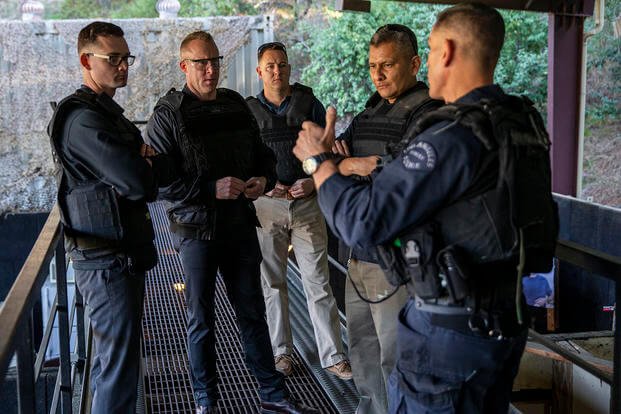I received a great email with several questions that many people ask as they are about to embark on a new fitness journey and career that requires a physical fitness test.
This former Marine writes:
"I go to the police academy in June and I am using the FBI SWAT Workout eBook found on the Military.com eBookstore. I used to be in great shape, I was a Marine for eight years and have been out for just over a year, battling illness that has put me out of shape. I was wondering if there is a particular time of day that I should follow your workout guide (In the morning after waking up, or at night after work), how much sleep I should get. I mean, after being in the Corps for such a long time, I am used to being able to operate on little sleep, but do you recommend a certain number of sleep hours per night?
And the final question is, how do you motivate yourself on those days when you just don't feel like working out? I want to make sure the Sheriff's Department gets a return on their investment in me, and I also don't want to embarrass myself or the Corps by just being a mediocre performer at the academy."
With the positive attitude you have going into this new law enforcement career, I doubt you will embarrass yourself or the Corps. Ninety percent of performing at the top of your class is positive attitude, and the remaining 10% is preparing physically with the program you have.
Here is a plan of action before arriving at the police academy:
1. Use the FBI SWAT Workout
Continue using the FBI SWAT Workout eBooks since they will be very similar to the tasks and exercises you will have to perform at the police academy. This is a six-week course, but it can be completed twice for a total of 12 weeks. The additional six weeks will enable you to master the workouts thoroughly, because they will be tough if you have not exercised regularly in the past year.
2. Find the best time to work out
Find the time of day that works best for you to train. Many people in the military get accustomed to early morning workouts, but everyone is different. Some are better at early morning, while others like the midday or evening to train. Statistics say that people are twice as likely to exercise if they schedule it in the morning rather than later in the day. When starting out after several months of inactivity, it may be better to run and do cardio in the morning and weights or PT in the afternoon.
3. Rest days should be rest days
Being young, the body requires minimal sleep to recover from long days of work or challenging workouts, but as we age, rest days should be rest days. On a rest day, you should do nothing physical but stretch. Every day of workouts will tire your body and require those particular muscle groups that you exercised to recover for at least 24-48 hours. As far as sleep, try to get eight hours if you can. You will grow muscle better when you sleep a minimum of eight hours a night. See nutrition tips in the Military.com Article Archives to see pre- and post-workout meals that also will help with recovery and muscle regeneration.
4. Use "warm up with crunches" as motivation
And finally, how do you motivate yourself when you just do not feel like exercising? If I had that answer, my name would be in lights worldwide. But I feel I have a solution that does not require you to stand, does not cost a dime and only takes five minutes to change you from too tired to exercise to ready to go.
It is called "warm up with crunches." See the crunches link and do the following set of easy abdominal exercises to get the internal juices flowing. This will wake you up, warm you up and prepare you for exercise. I like to wake up with:
- Regular crunches 25
- Reverse crunches 25
- Double crunches 25
- Left crunches 25
- Right crunches 25
- Stretch abs and lower back
See, that was not too bad and just a "little bit harder than sleeping."
These tips will help if you practice these methods during the weeks before your PFT. Good luck in your next PFT and your new law enforcement career.
Also read the following Military.com articles found in the Stew Smith article archive for more information:
Stew Smith is a former Navy SEAL and fitness author certified as a Strength and Conditioning Specialist (CSCS) with the National Strength and Conditioning Association. Visit his Fitness eBook store if you're looking to start a workout program to create a healthy lifestyle. Send your fitness questions to stew@stewsmith.com.
Want to Learn More About Military Life?
Whether you're thinking of joining the military, looking for fitness and basic training tips, or keeping up with military life and benefits, Military.com has you covered. Subscribe to Military.com to have military news, updates and resources delivered directly to your inbox.




















